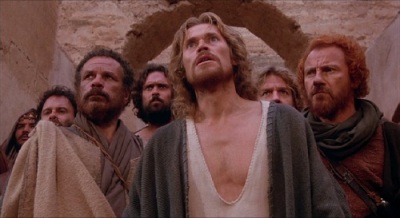I can admit I may not be an expert on Christ related cinema. I haven’t seen The Passion or many other movies that have to do with Jesus and his life. I have however seen The Last Temptation of Christ by Martin Scorcese. I liked the movie, I really did, but all of this isn’t about my opinions on the quality of the movie. Instead I want to dive into the discussion of The Last Temptation’s controversy. Still, to this day, this may be one of the most controversial films ever made. To put that into perspective this movie caused a few fundamentalist Christians in France to set fire to some cinemas showing the film. This caused serious injuries and one death. Not many movies can say they’ve made such an impact, but, ultimately, that isn’t really a good thing to boast about.

What can make a movie to be so controversial? Of course the arts are the first thing targeted in the sights of controversy. This is because anything artistic is a form of expression, and naturally people can have controversial opinions that they aim to express. The Last Temptation of Christ’s big source of controversy in a nutshell is that it portrays Jesus as human. To go further into that, it shows Christ actually sin. In the film he has sex with Mary Magdalene and that is a big no-no for a lot of religious people. To go even further than that, to me, the big controversial piece is that while on the cross Jesus decided he actually didn’t want to die for our sins.
I can’t really understand all the chaos for this but I’m not any form of Christian. It’s even further pushing me from truly understanding Christ related cinema, but I am here arguing in favour of The Last Temptation, and my not having any religious belief is actually beneficial. Hear me out on this.
When Jesus decided that he didn’t want to die on the cross that was the moment where I could truly and absolutely relate to him. It was at this moment where I didn’t see Jesus, I didn’t see Willem Dafoe, I saw a human who was scared that he was going to die. His plea for God to take it all back was really strong and then God decides to give him this chance. Enter the scanadalous and infamous latter bit of the movie.

Now we see Jesus go about his life as if he wasn’t crucified and his whole cause and campaign of sorts was put aside. He’s merely a man now, not a prophet of God. (Again, I must apologise if prophet is the wrong word here, I’m not too sure myself.) He engages in a sexual relationship with Mary Magdalene, but this is merely just personifying him more as a human. Mind you I’m not blind to why this would be offputting to a follower of Christianity. As the movies gets closer and closers to its end Jesus does more and more human things, and less and less Jesus things.
Jesus, now an old man on his deathbed asks to be visited by all of his old apostles. Judas eventually comes and essentially condemns Jesus for giving up his causes as Jersualem burns around them. This is the big moment where I find all the controversy is moot. It’s here that we are shown that the angel following Jesus around was actually Satan trying to tempt Jesus away from his cause. Jesus stands up to this ‘angel’, and then begs God to give him a second chance. He wants to die for our sins, he realizes his mistake and he asks for forgiveness and a second chance. God grants him this and Jesus’ last temptation was resisted.
WHAM.
That’s the sound of religion punching you in the face.
It was at this moment that I truly believed in the cause of Jesus. Making Jesus break down and realize the right thing to do was probably the most powerful religious moment I’ve had in recent memory. What this did was take the God out of Jesus, this made Jesus’ struggle real, relateable and emotional. It’s funny, as an outsider to religion I don’t see any of the controversy or problem with it. I actually view everything they were concerned about as a good thing. It increased the power of Jesus and made their religion that much more believeable. Giving Jesus a reason to struggle and doubt is what made it so successful to me. If it was a movie about Jesus being Jesus and everyone worshipping him then that wouldn’t have the same impact. In the end why condemn the art that could actually be a positive contributing factor to a ‘non-believers’ respect to your own belief? That’s just silly and counterproductive and hurts your beliefs a lot more than any film ever could.

I’ll be back to the less serious stuff next week. Probably.
